Unit 5 Amazing things &6Grammar一般过去时课件 (共56张PPT)
文档属性
| 名称 | Unit 5 Amazing things &6Grammar一般过去时课件 (共56张PPT) |  | |
| 格式 | pptx | ||
| 文件大小 | 2.5MB | ||
| 资源类型 | 教案 | ||
| 版本资源 | 牛津译林版 | ||
| 科目 | 英语 | ||
| 更新时间 | 2022-04-16 11:10:25 | ||
图片预览

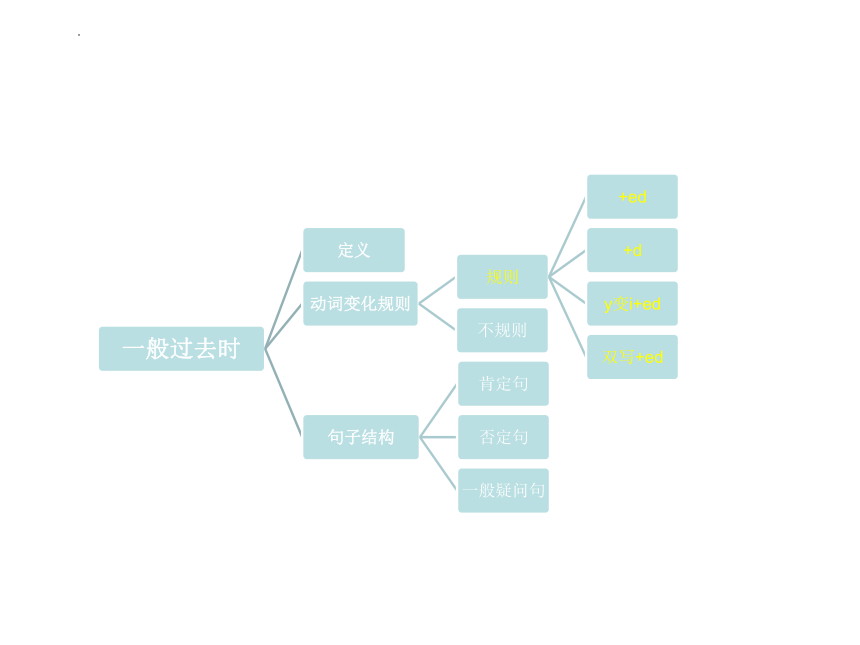
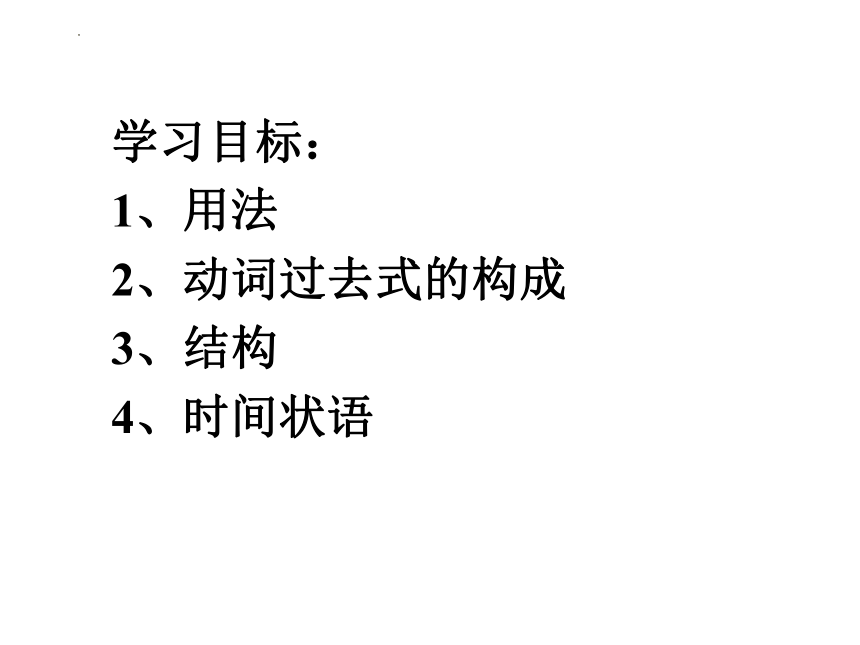
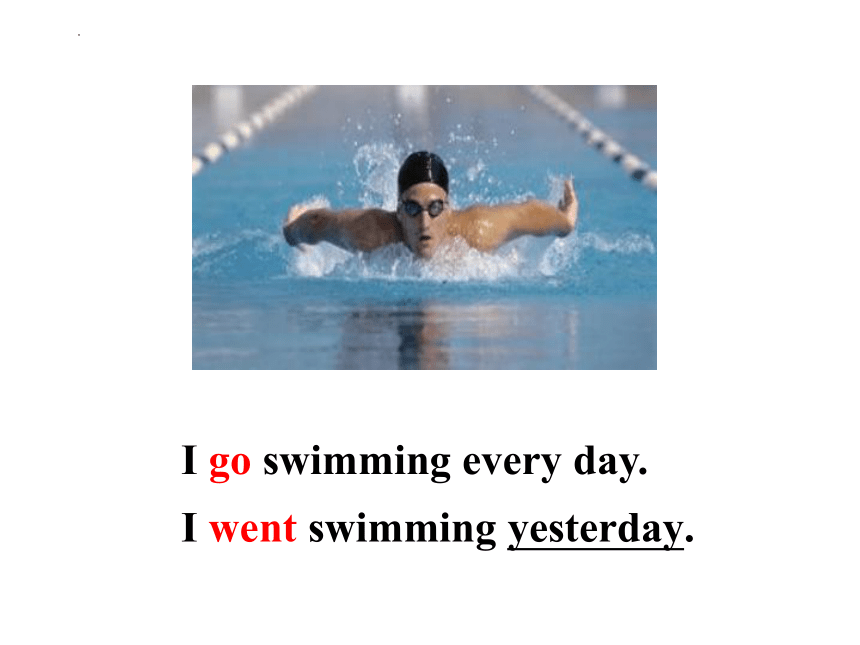
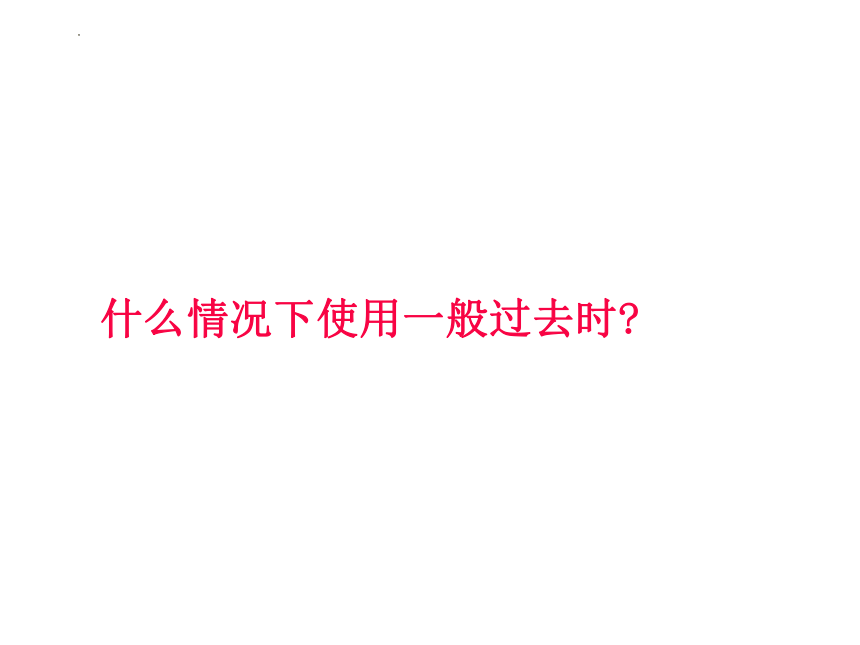
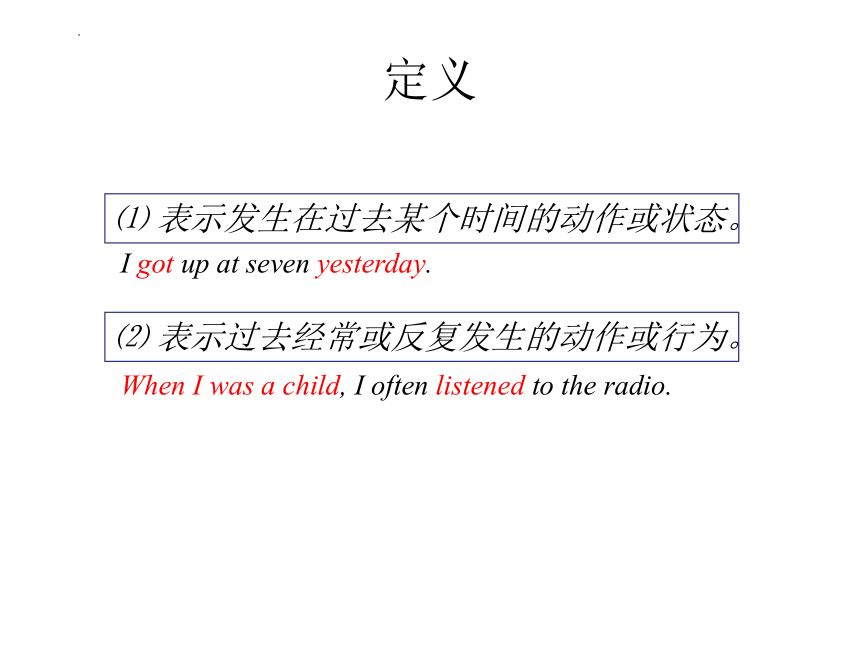
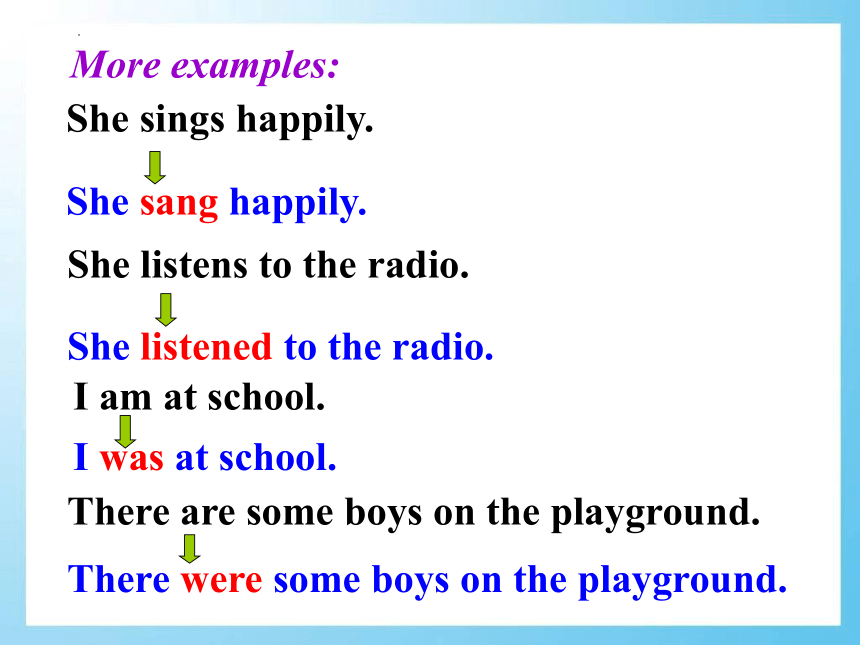
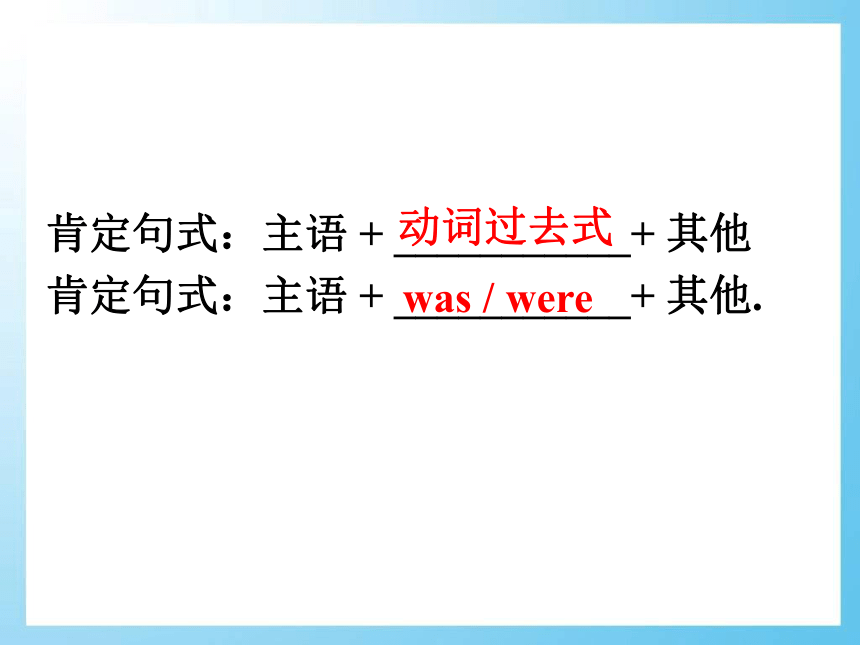
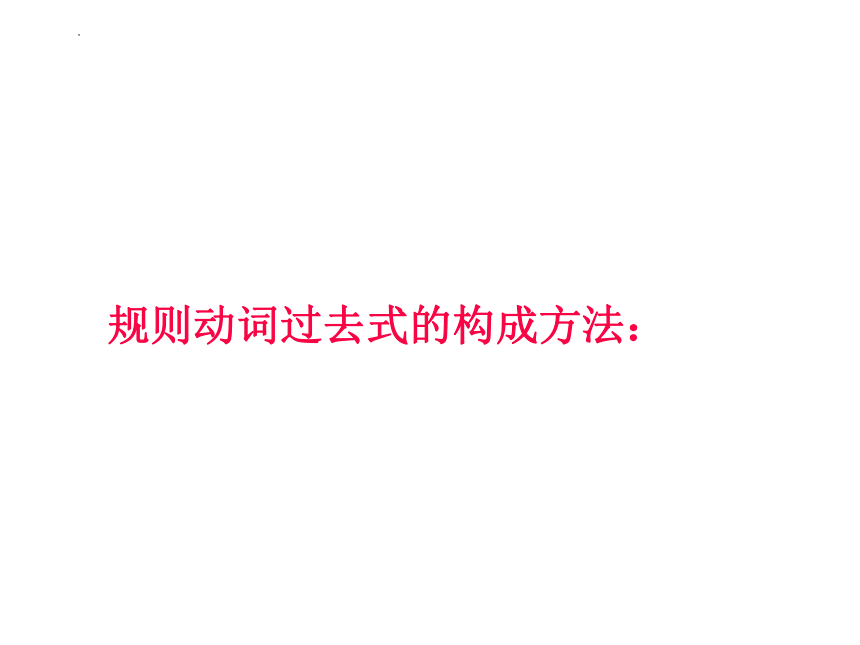
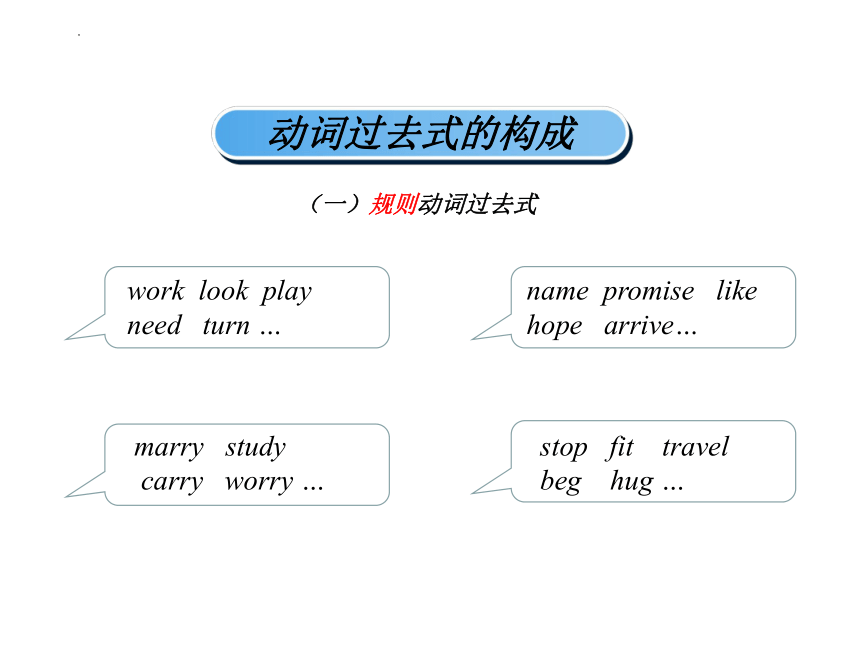
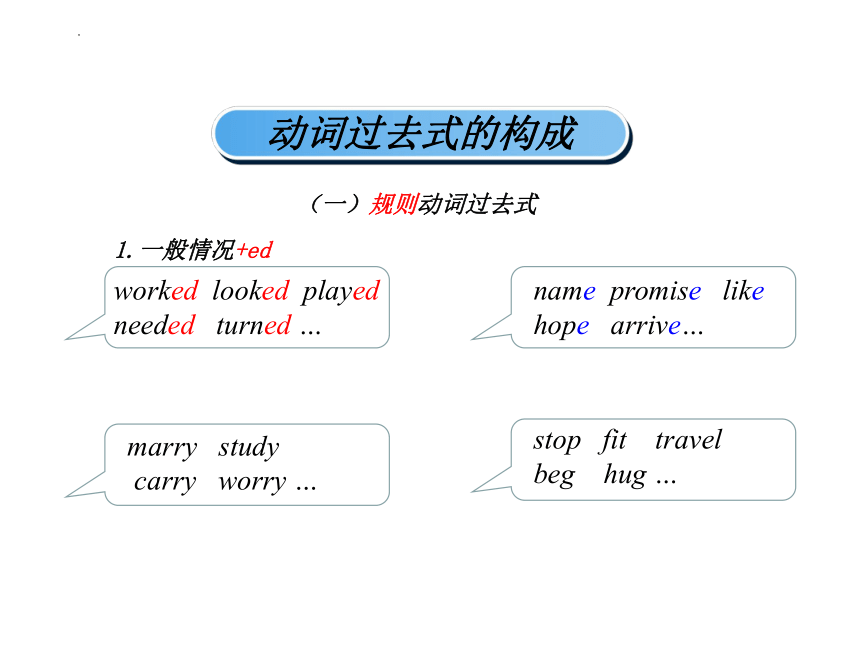
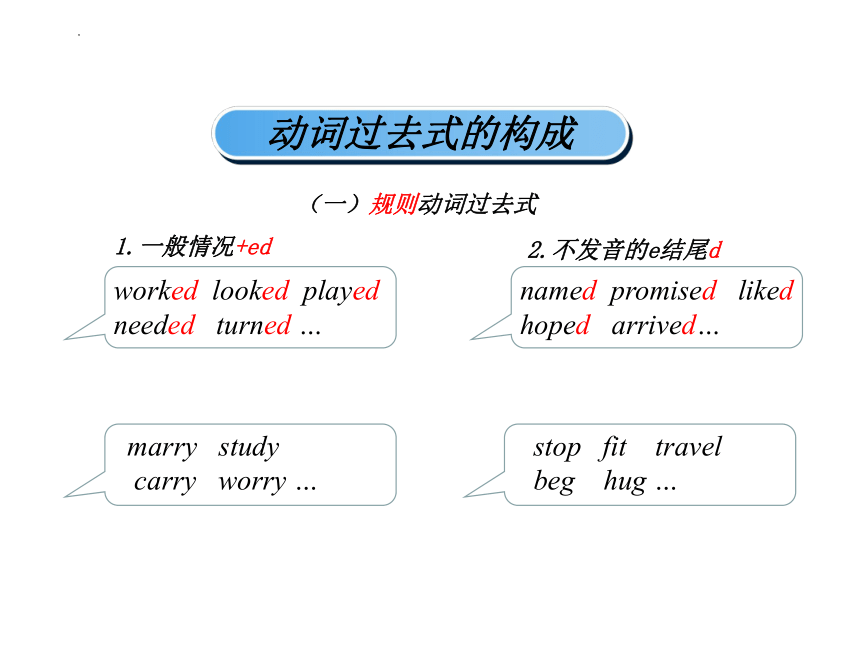
文档简介
(共56张PPT)
一般过去时
学习目标:
1、用法
2、动词过去式的构成
3、结构
4、时间状语
I went swimming yesterday.
I go swimming every day.
什么情况下使用一般过去时
定义
⑴ 表示发生在过去某个时间的动作或状态。
I got up at seven yesterday.
⑵ 表示过去经常或反复发生的动作或行为。
When I was a child, I often listened to the radio.
She sings happily.
She sang happily.
I am at school.
I was at school.
She listens to the radio.
She listened to the radio.
There are some boys on the playground.
There were some boys on the playground.
More examples:
肯定句式:主语 + ___________+ 其他
肯定句式:主语 + ___________+ 其他.
动词过去式
was / were
规则动词过去式的构成方法:
(一)规则动词过去式
work look play
need turn …
name promise like
hope arrive…
marry study
carry worry …
stop fit travel
beg hug …
动词过去式的构成
(一)规则动词过去式
name promise like
hope arrive…
marry study
carry worry …
stop fit travel
beg hug …
worked looked played
needed turned …
1.一般情况+ed
动词过去式的构成
(一)规则动词过去式
named promised liked
hoped arrived…
marry study
carry worry …
stop fit travel
beg hug …
worked looked played
needed turned …
1.一般情况+ed
2.不发音的e结尾d
动词过去式的构成
(一)规则动词过去式
named promised liked
hoped arrived…
married studied carried worried …
stop fit travel
beg hug …
worked looked played
needed turned …
1.一般情况+ed
2.不发音的e结尾+d
3.辅音字母加y结尾,改为i+ed
动词过去式的构成
(一)规则动词过去式
named promised liked
hoped arrived…
married studied carried worried …
stopped fitted travelled
begged hugged …
worked looked played
needed turned …
1.一般情况+ed
2.不发音的e结尾+d
3.辅音字母加y结尾,改为i+ed
4.双写最后一个字母+ed
动词过去式的构成
want— talk —
like — worry —
try — stop —
wanted
talked
liked
worried
tried
stopped
写出下列动词的过去式。
不规则动词的过去式不是加ed 构成的,需要记住它们。不规则动词的过去式归纳起来有这样几种类型:
1 与原形一样, 没有变化 cost-cost put-put
2 元音有变化 write-wrote know-knew
3 辅音有变化 make-made spend-spent
4 元音和辅音都有变化 leave-left teach-taught
5 其他 am/is-was
are-were
(二) 不 规 则 动 词 过 去 式 Verb Past tense
am/is was
are were
buy bought
do/does did
eat ate
go went
have/has had
ride rode
see saw
…… ……
Millie wants to practise using the simple past tense. Help her write the simple past tense of the verbs below.
start _______
love _______
play ______
plan ______
5. reply ______
6. say ______
7. meet ______
8. hear ______
9. leave ______
10. tell ______
11. stand ______
12. bring ______
started
played
loved
planned
said
replied
left
met
stood
told
heard
brought
The students visited the Fun World Museum. Here is Millie’s diary entry. Help her complete it with the simple past tense of the verbs in brackets.
This morning, we _____ (go) to the Fun World Museum. When we ____ (get) to the museum, there _____ (be) a lot of people there. We _____ (spend) three hours in the museum. I ____ (take) a lot of photos. Some of us _______ (buy) cards of the animals there. We _____ (come) back to school at 1 p.m. We ____ (have) a great time!
went
were
spent
took
bought
came
had
got
Daniel did not go to the Fun World Museum. Millie is telling him about the visit. Help Millie complete the conversation.
Millie: We _____ (go) to the Fun World Museum
the day before yesterday, Daniel. It ____
(be) so interesting!
Daniel: Really Tell me all about it.
Millie: OK. We ____ (see) a small monkey, only
11 centimetres tall.
Daniel: That’s amazing! What else
Millie: We also _____ (learn) about some
strange birds like dodos. They _____ (live)
on the earth a long time ago.
Daniel: That’s cool!
went
saw
was
learnt
lived
My father and I went fishing yesterday.
My father and I go boating yesterday.
didn’t
The students were in the classroom.
The students were not on the playground.
We watched a film.
We didn’t watch a film.
The students visited the Palace Museum.
The students didn’t visit the Palace Museum.
They were in the classroom.
They weren’t in the classroom.
There was a pencil in the bag.
There wasn’t a pencil in the bag.
否定句式:主语 + __________________+ 其他. (did not可缩略为didn’t)
否定句式:主语 + _____________+ 其他.(was not可缩略为wasn’t;were not可缩略为weren’t)
did not + 动词原形
was / were not
They played basketball.
They didn’t play football.
Did they play basketball
Yes, they did.
Did they play football
No, they didn’t.
There was a bird in the tree.
Was there a bird in the tree
Yes, there was.
No, there wasn’t.
She found herself alone in a long, low hall.
She didn’t find herself alone in a long, low hall.
Did she find herself alone in a long, low hall
Yes, she did.
No, she didn’t.
More examples:
一般疑问句式及其回答:Was / Were + 主语 + 其他
肯定回答:Yes, 主语 +____________
否定回答:No, 主语 +_______________
was/were.
wasn’t / weren’t.
We use the simple past tense to make positive and negative sentences like this:
I/You/We/They
/He/She /It
did not hear
a sound.
I/You/We/They/He/She/It
heard
a sound.
Simple past tense
I/He/She/It
You/We/They
was
were
at home
yesterday.
I/He/She/It
You/We/They
was not
were not
at home
yesterday.
I/you/
we/they/
he/she/it
hear
a sound
Did
Yes,
No,
I/you/
we/they/
he/she/it
did.
did not.
We use the simple past tense to ask and answer questions like this:
Was I/he/she/it at home yesterday
Were you/we/they
Yes, I/he/she/it was.
you/we/they were.
No, I/he/she/it was not.
you/we/they were not.
提示:一般过去时常与表示过去的
时间状语连用,如:yesterday, last night, a month ago, yesterday afternoon, last week, ten years ago
总结:
1、Yesterday类
2、last类
3、一段时间+ago
4、in +年份
5、in the past /just now
/this morning
Millie is writing about what she and her friends did last weekend. Help her complete her article with the correct forms of the verbs in the box.
do go have play
practise read stay visit
Yesterday was Sunday. I (1) ______ the park and (2) ____ a good time. Simon did not (3) ____ football. He (4) _________ playing volleyball with his friend. Kitty likes shopping. She (5) ____ some shopping with her mum yesterday afternoon. Daniel did not (6) ___ out yesterday. He (7) ______ at home and (8) _____ some books.
practised
did
go
stayed
read
visited
had
play
Sandy is asking Simon about his camping trip with his family. Complete their conversation with the correct forms of the verbs in brackets.
Sandy: (1) ___ you and your family ___ (go) camping last week
Simon: No, we (2) _____. We (3) ____ (go) camping last month.
Did
go
didn’t
went
Sandy: (4) ____ (be) it interesting
Simon: Yes, it (5) ____.
Sandy: What (6) ____ you ___ (do) there
Simon: We (7) ____ (put) up our tent near a lake. My cousin Annie and I (8) _____ (be) very happy. We also (9) ______ (row) a boat on the lake.
Was
was
did
do
put
were
rowed
Sandy: (10) ____ you ____ (stay) outside all night
Simon: Yes, we (11) ___. The camping trip (12) ____ (be) really wonderful.
Did
stay
did
was
1. I visited the park and had a good time.
have a good time = have fun=enjoy oneself
e.g. 昨天我们在公园玩的很开心。
We ______________ in the park
yesterday.
We _______ in the park yesterday.
We _______________ in the park
yesterday.
had a good time
had fun
enjoyed ourselves
2. Daniel did not go out yesterday.
go out 外出
e.g. 你刚才出去了吗? 是的。
____ you ______ just now
Yes, I ___.
did
Did go out
3. He stayed at home and read some books.
stay 表示停留或继续, 处在某一状态
stay outside 呆在外面
e.g. 我计划周末呆在家。
I plan to ___________ this weekend.
stay at home
4. Did you and your family go camping last week
last + 表示时间的词用于过去时
e.g. 上星期 上个月 去年
5. We put up our tent… 搭帐篷
put up 搭,竖立
e.g. 他在公园里搭了一个帐篷。
He ______ a tent in the park.
last year
put up
last week
last month
Fill in the blanks.
1. Her father ____ (read) a newspaper last night.
2. ___ you ____ (visit) your relatives last Spring Festival
3. ____ he ___ (fly) a kite on Sunday Yes, he _____.
read
Did visit
Did fly
did
Let's practice!
4. What ___ she ___ (find) in the garden
last morning
She _____ (find) a beautiful butterfly.
5. It ____ (be) Ben’s birthday last Friday.
6. We all ____ (have) a good time last night.
7. He _______ (jump) high on last Sports
Day.
did
found
find
was
had
jumped
8. It ____ (be) the 2nd of November yesterday. Mr White ____ (go) to his office by car.
9. Gao Shan ___ (put) the book on his head a moment ago.
10. Don’t _____ the house. Mum
_______ it yesterday. (clean)
was
went
put
clean
cleaned
1. Lucy did her homework at home.(改
否定句)
Lucy _____ ___ her homework at home.
2. He found some meat in the fridge.(变
一般疑问句)
___ he ____ ___ meat in the fridge
didn’t do
Did
句型转换
find any
3. She stayed there for a week.
(对划线部分提问)
____ ____ ___ she ____ there
4. There was some orange in the cup.
(变一般疑问句)
____ there ____ orange in the cup
How long did
Was
stay
any
Write the simple past form of the following verbs.
sit - do-
fall- hear-
look- find-
see- hit-
say- be-
sat
fell
looked
saw
said
did
heard
found
hit
was / were
take- notice-
stand- put-
run- open-
jump- can-
try- want-
let- get-
took
stood
ran
jumped
tried
let
noticed
put
opened
could
wanted
got
What did you do last week
两人一组进行对话,运用一般过去时的肯定、否定和疑问句式。
一般过去时
学习目标:
1、用法
2、动词过去式的构成
3、结构
4、时间状语
I went swimming yesterday.
I go swimming every day.
什么情况下使用一般过去时
定义
⑴ 表示发生在过去某个时间的动作或状态。
I got up at seven yesterday.
⑵ 表示过去经常或反复发生的动作或行为。
When I was a child, I often listened to the radio.
She sings happily.
She sang happily.
I am at school.
I was at school.
She listens to the radio.
She listened to the radio.
There are some boys on the playground.
There were some boys on the playground.
More examples:
肯定句式:主语 + ___________+ 其他
肯定句式:主语 + ___________+ 其他.
动词过去式
was / were
规则动词过去式的构成方法:
(一)规则动词过去式
work look play
need turn …
name promise like
hope arrive…
marry study
carry worry …
stop fit travel
beg hug …
动词过去式的构成
(一)规则动词过去式
name promise like
hope arrive…
marry study
carry worry …
stop fit travel
beg hug …
worked looked played
needed turned …
1.一般情况+ed
动词过去式的构成
(一)规则动词过去式
named promised liked
hoped arrived…
marry study
carry worry …
stop fit travel
beg hug …
worked looked played
needed turned …
1.一般情况+ed
2.不发音的e结尾d
动词过去式的构成
(一)规则动词过去式
named promised liked
hoped arrived…
married studied carried worried …
stop fit travel
beg hug …
worked looked played
needed turned …
1.一般情况+ed
2.不发音的e结尾+d
3.辅音字母加y结尾,改为i+ed
动词过去式的构成
(一)规则动词过去式
named promised liked
hoped arrived…
married studied carried worried …
stopped fitted travelled
begged hugged …
worked looked played
needed turned …
1.一般情况+ed
2.不发音的e结尾+d
3.辅音字母加y结尾,改为i+ed
4.双写最后一个字母+ed
动词过去式的构成
want— talk —
like — worry —
try — stop —
wanted
talked
liked
worried
tried
stopped
写出下列动词的过去式。
不规则动词的过去式不是加ed 构成的,需要记住它们。不规则动词的过去式归纳起来有这样几种类型:
1 与原形一样, 没有变化 cost-cost put-put
2 元音有变化 write-wrote know-knew
3 辅音有变化 make-made spend-spent
4 元音和辅音都有变化 leave-left teach-taught
5 其他 am/is-was
are-were
(二) 不 规 则 动 词 过 去 式 Verb Past tense
am/is was
are were
buy bought
do/does did
eat ate
go went
have/has had
ride rode
see saw
…… ……
Millie wants to practise using the simple past tense. Help her write the simple past tense of the verbs below.
start _______
love _______
play ______
plan ______
5. reply ______
6. say ______
7. meet ______
8. hear ______
9. leave ______
10. tell ______
11. stand ______
12. bring ______
started
played
loved
planned
said
replied
left
met
stood
told
heard
brought
The students visited the Fun World Museum. Here is Millie’s diary entry. Help her complete it with the simple past tense of the verbs in brackets.
This morning, we _____ (go) to the Fun World Museum. When we ____ (get) to the museum, there _____ (be) a lot of people there. We _____ (spend) three hours in the museum. I ____ (take) a lot of photos. Some of us _______ (buy) cards of the animals there. We _____ (come) back to school at 1 p.m. We ____ (have) a great time!
went
were
spent
took
bought
came
had
got
Daniel did not go to the Fun World Museum. Millie is telling him about the visit. Help Millie complete the conversation.
Millie: We _____ (go) to the Fun World Museum
the day before yesterday, Daniel. It ____
(be) so interesting!
Daniel: Really Tell me all about it.
Millie: OK. We ____ (see) a small monkey, only
11 centimetres tall.
Daniel: That’s amazing! What else
Millie: We also _____ (learn) about some
strange birds like dodos. They _____ (live)
on the earth a long time ago.
Daniel: That’s cool!
went
saw
was
learnt
lived
My father and I went fishing yesterday.
My father and I go boating yesterday.
didn’t
The students were in the classroom.
The students were not on the playground.
We watched a film.
We didn’t watch a film.
The students visited the Palace Museum.
The students didn’t visit the Palace Museum.
They were in the classroom.
They weren’t in the classroom.
There was a pencil in the bag.
There wasn’t a pencil in the bag.
否定句式:主语 + __________________+ 其他. (did not可缩略为didn’t)
否定句式:主语 + _____________+ 其他.(was not可缩略为wasn’t;were not可缩略为weren’t)
did not + 动词原形
was / were not
They played basketball.
They didn’t play football.
Did they play basketball
Yes, they did.
Did they play football
No, they didn’t.
There was a bird in the tree.
Was there a bird in the tree
Yes, there was.
No, there wasn’t.
She found herself alone in a long, low hall.
She didn’t find herself alone in a long, low hall.
Did she find herself alone in a long, low hall
Yes, she did.
No, she didn’t.
More examples:
一般疑问句式及其回答:Was / Were + 主语 + 其他
肯定回答:Yes, 主语 +____________
否定回答:No, 主语 +_______________
was/were.
wasn’t / weren’t.
We use the simple past tense to make positive and negative sentences like this:
I/You/We/They
/He/She /It
did not hear
a sound.
I/You/We/They/He/She/It
heard
a sound.
Simple past tense
I/He/She/It
You/We/They
was
were
at home
yesterday.
I/He/She/It
You/We/They
was not
were not
at home
yesterday.
I/you/
we/they/
he/she/it
hear
a sound
Did
Yes,
No,
I/you/
we/they/
he/she/it
did.
did not.
We use the simple past tense to ask and answer questions like this:
Was I/he/she/it at home yesterday
Were you/we/they
Yes, I/he/she/it was.
you/we/they were.
No, I/he/she/it was not.
you/we/they were not.
提示:一般过去时常与表示过去的
时间状语连用,如:yesterday, last night, a month ago, yesterday afternoon, last week, ten years ago
总结:
1、Yesterday类
2、last类
3、一段时间+ago
4、in +年份
5、in the past /just now
/this morning
Millie is writing about what she and her friends did last weekend. Help her complete her article with the correct forms of the verbs in the box.
do go have play
practise read stay visit
Yesterday was Sunday. I (1) ______ the park and (2) ____ a good time. Simon did not (3) ____ football. He (4) _________ playing volleyball with his friend. Kitty likes shopping. She (5) ____ some shopping with her mum yesterday afternoon. Daniel did not (6) ___ out yesterday. He (7) ______ at home and (8) _____ some books.
practised
did
go
stayed
read
visited
had
play
Sandy is asking Simon about his camping trip with his family. Complete their conversation with the correct forms of the verbs in brackets.
Sandy: (1) ___ you and your family ___ (go) camping last week
Simon: No, we (2) _____. We (3) ____ (go) camping last month.
Did
go
didn’t
went
Sandy: (4) ____ (be) it interesting
Simon: Yes, it (5) ____.
Sandy: What (6) ____ you ___ (do) there
Simon: We (7) ____ (put) up our tent near a lake. My cousin Annie and I (8) _____ (be) very happy. We also (9) ______ (row) a boat on the lake.
Was
was
did
do
put
were
rowed
Sandy: (10) ____ you ____ (stay) outside all night
Simon: Yes, we (11) ___. The camping trip (12) ____ (be) really wonderful.
Did
stay
did
was
1. I visited the park and had a good time.
have a good time = have fun=enjoy oneself
e.g. 昨天我们在公园玩的很开心。
We ______________ in the park
yesterday.
We _______ in the park yesterday.
We _______________ in the park
yesterday.
had a good time
had fun
enjoyed ourselves
2. Daniel did not go out yesterday.
go out 外出
e.g. 你刚才出去了吗? 是的。
____ you ______ just now
Yes, I ___.
did
Did go out
3. He stayed at home and read some books.
stay 表示停留或继续, 处在某一状态
stay outside 呆在外面
e.g. 我计划周末呆在家。
I plan to ___________ this weekend.
stay at home
4. Did you and your family go camping last week
last + 表示时间的词用于过去时
e.g. 上星期 上个月 去年
5. We put up our tent… 搭帐篷
put up 搭,竖立
e.g. 他在公园里搭了一个帐篷。
He ______ a tent in the park.
last year
put up
last week
last month
Fill in the blanks.
1. Her father ____ (read) a newspaper last night.
2. ___ you ____ (visit) your relatives last Spring Festival
3. ____ he ___ (fly) a kite on Sunday Yes, he _____.
read
Did visit
Did fly
did
Let's practice!
4. What ___ she ___ (find) in the garden
last morning
She _____ (find) a beautiful butterfly.
5. It ____ (be) Ben’s birthday last Friday.
6. We all ____ (have) a good time last night.
7. He _______ (jump) high on last Sports
Day.
did
found
find
was
had
jumped
8. It ____ (be) the 2nd of November yesterday. Mr White ____ (go) to his office by car.
9. Gao Shan ___ (put) the book on his head a moment ago.
10. Don’t _____ the house. Mum
_______ it yesterday. (clean)
was
went
put
clean
cleaned
1. Lucy did her homework at home.(改
否定句)
Lucy _____ ___ her homework at home.
2. He found some meat in the fridge.(变
一般疑问句)
___ he ____ ___ meat in the fridge
didn’t do
Did
句型转换
find any
3. She stayed there for a week.
(对划线部分提问)
____ ____ ___ she ____ there
4. There was some orange in the cup.
(变一般疑问句)
____ there ____ orange in the cup
How long did
Was
stay
any
Write the simple past form of the following verbs.
sit - do-
fall- hear-
look- find-
see- hit-
say- be-
sat
fell
looked
saw
said
did
heard
found
hit
was / were
take- notice-
stand- put-
run- open-
jump- can-
try- want-
let- get-
took
stood
ran
jumped
tried
let
noticed
put
opened
could
wanted
got
What did you do last week
两人一组进行对话,运用一般过去时的肯定、否定和疑问句式。
